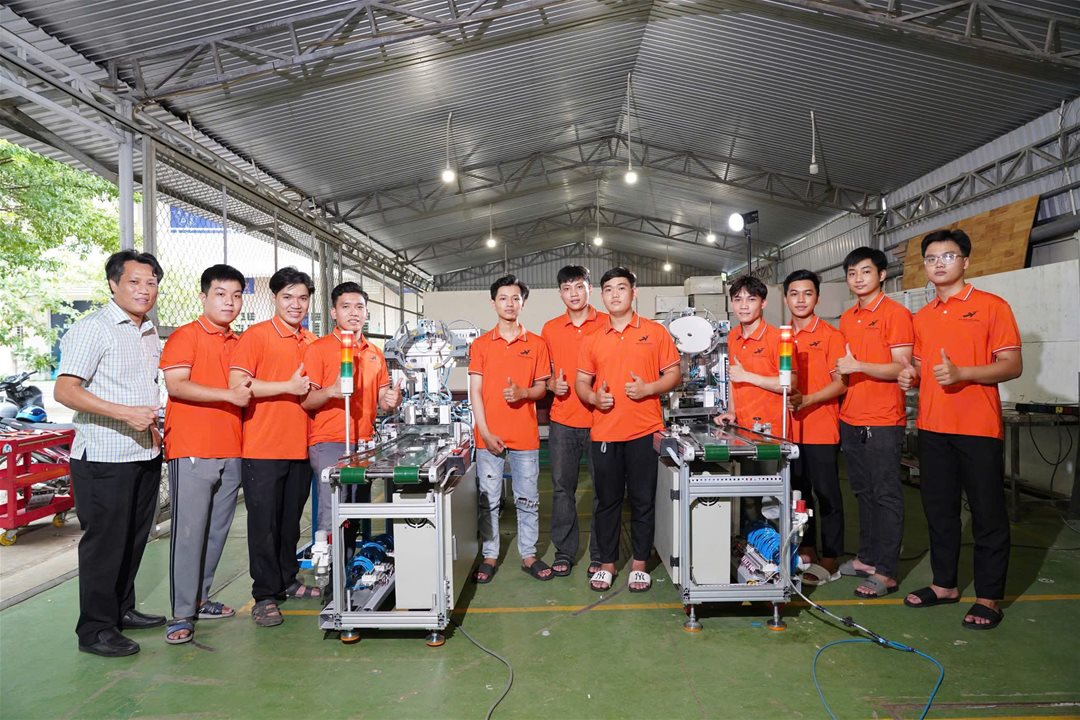Curriculum
CONTENTS
Solving the workforce shortage with a dual model
In the context of the Southern key economic region's urgent demand for high-quality human resources, Lac Hong University (LHU) is asserting its pioneering role by connecting with businesses and providing practical training, effectively addressing the "supply-demand" challenge for skilled labor and ensuring sustainable employment for its graduates.

Students from Lac Hong University's Faculty of Electrical and Electronic Engineering learn and gain practical experience through corporate projects starting from their second year.
Shortage of Skilled Labor: A Challenge to Sustainable Development
According to the Dong Nai Industrial Zones Authority, the province requires over 10,000 new workers annually, with more than 60% required to have college or university qualifications. The post-pandemic economic rebound and rapid industrial expansion have have further intensified recruitment demand, particularly for high-quality professionals equipped with both technical and soft skills, alongside increasingly demanding skill requirements.
However, a significant gap persists between university education and the practical demands of businesses. Many employers report that candidates often lack professional skills, foreign language proficiency, and a professional work ethic, negatively impacting operational efficiency. This disconnect presents a major sustainable development challenge.
LHU’s Dual Education Model: A Key to Workforce Sustainability
Strategically located in Dong Nai, a province boasting over 30 industrial parks and more than 1,200 foreign direct investment (FDI) enterprises—a hub for manufacturing, processing, high-tech industries, supporting industries, transportation, logistics, and e-commerce—Lac Hong University leverages its geographical advantages to forge deep collaborative relationships with the business community.
Embracing a philosophy of “practical, career-aligned education,” the university has implemented a robust cooperation framework that includes:
-
Industry co-designed curricula
-
Memoranda of Understanding (MoUs) for training and recruitment
-
Long-term internships and enterprise semesters
-
Guest lectures by corporate experts
-
Simulated enterprise labs for real-world learning
This creates a practical learning ecosystem, ensuring graduates meet societal demands.
The university champions a dual model of "Training – Scholarships – Internships – Recruitment," which helps students gain early career orientation, undertake practical training at businesses from their third year, and secure employment opportunities immediately after graduation.

Lac Hong University has established a Center for Scientific Research and Application, featuring nearly 40 laboratories and practical training rooms for students in engineering and health sciences fields.
Dr. Lam Thanh Hien, Rector of Lac Hong University, stated: "LHU implements a closed-loop training strategy: students receive clear career guidance from their first year, engage in up-to-date curricula, receive scholarships from businesses, participate in practical projects with businesses from their second year, and complete internships from their third year, significantly enhancing their employability upon graduation."
This model not only empowers businesses to proactively build their workforce but also enables students to adapt quickly to the work environment, accumulate industry experience, and boost their career prospects. Data from three consecutive academic years (2021-2022 to 2023-2024) shows that 95.29% of LHU graduates found employment within one year, a remarkable figure amidst a highly competitive recruitment landscape.
Prominent companies such as SMC, Bosch, Panasonic, CP Group, MiTek, Taekwang, HD Bank, and Sacombank have become strategic partners, providing scholarships, accepting student interns, and recruiting graduates.
Meaningful Contributions to Sustainable Development
Lac Hong University's training model not only addresses the urgent human resource challenge but also demonstrates the university's strong commitment to the United Nations Sustainable Development Goals (SDGs).
Specifically, LHU contributes to SDG 4 (Quality Education) through flexible, practice-oriented curricula and 21st-century skills, providing lifelong learning opportunities for students via industry partnerships. For SDG 8 (Decent Work and Economic Growth), the university cultivates a skilled workforce, reducing graduate unemployment. LHU also supports SDG 11 (Sustainable Cities and Communities) by supplying human resources for green industrial development and promoting sustainable practices within academic and corporate environments. Finally, the university excels in SDG 17 (Partnerships for the Goals) by fostering effective collaborations with businesses in education and recruitment.
Through its commitment to practical learning and cross-sector partnerships, LHU generates measurable social and economic impact while advancing sustainable higher education in Vietnam.
“At LHU, students are equipped not only with academic knowledge but also real-world experience through corporate collaboration programs. This prepares them to contribute immediately and confidently to their future employers.”
— Representative of a strategic industry partner

